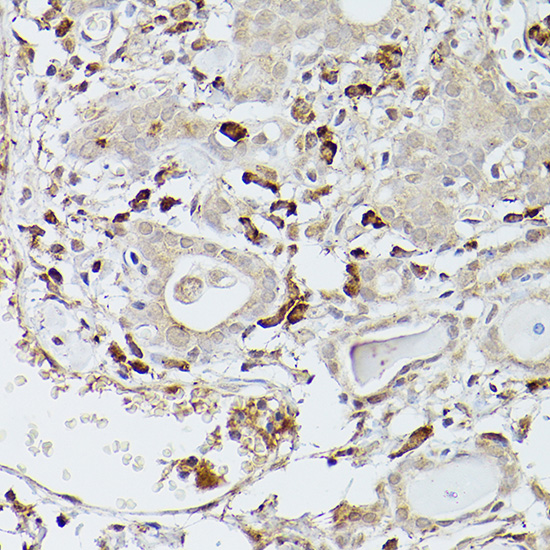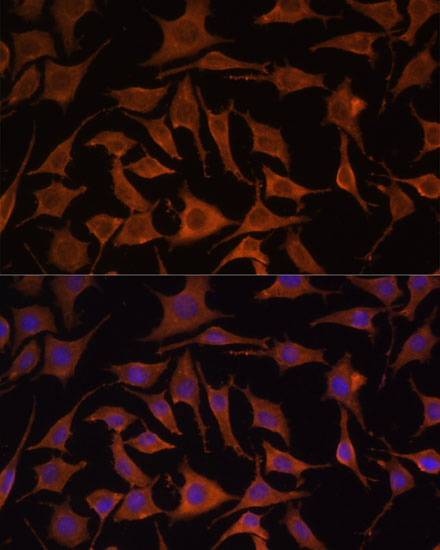Product Name :
TNF-α polyclonal antibody Background :
Tumor Necrosis Factor Alpha (TNF alpha) is a protein secreted by lipopolysaccharide stimulated macrophages, and causes tumor necrosis when injected into tumour bearing mice. TNF alpha is believed to mediate pathogenic shock and tissue injury associated with endotoxemia. TNF alpha exists as a multimer of two, three, or five noncovalently linked units, but shows a single 17 a band following SDS PAGE under non reducing conditions. TNF alpha is closely related to the 25 a protein Tumour Necrosis Factor beta (lymphotoxin), sharing the same receptors and cellular actions. TNF alpha causes cytolysis or cytostasis of certain transformed cells, being synergistic with interferon gamma in its cytotoxicity. Although it has little effect on many cultured normal human cells, TNF alpha appears to be directly toxic to vascular endothelial cells. Product :
Rabbit IgG, 1mg/ml in PBS with 0.02% sodium azide, 50% glycerol, pH7.2 Storage&Stability :
Store at 4°C short term. Aliquot and store at -20°C long term. Avoid freeze-thaw cycles. Specificity :
TNF-α polyclonal antibody detects endogenous levels of TNF-α protein. Immunogen :
A synthetic peptide corresponding to a sequence within amino acids 1-100 of human TNF (NP_000585.2). Conjugate :
Unconjugated Modification :
Unmodification
TNF-α polyclonal antibody Background :
Tumor Necrosis Factor Alpha (TNF alpha) is a protein secreted by lipopolysaccharide stimulated macrophages, and causes tumor necrosis when injected into tumour bearing mice. TNF alpha is believed to mediate pathogenic shock and tissue injury associated with endotoxemia. TNF alpha exists as a multimer of two, three, or five noncovalently linked units, but shows a single 17 a band following SDS PAGE under non reducing conditions. TNF alpha is closely related to the 25 a protein Tumour Necrosis Factor beta (lymphotoxin), sharing the same receptors and cellular actions. TNF alpha causes cytolysis or cytostasis of certain transformed cells, being synergistic with interferon gamma in its cytotoxicity. Although it has little effect on many cultured normal human cells, TNF alpha appears to be directly toxic to vascular endothelial cells. Product :
Rabbit IgG, 1mg/ml in PBS with 0.02% sodium azide, 50% glycerol, pH7.2 Storage&Stability :
Store at 4°C short term. Aliquot and store at -20°C long term. Avoid freeze-thaw cycles. Specificity :
TNF-α polyclonal antibody detects endogenous levels of TNF-α protein. Immunogen :
A synthetic peptide corresponding to a sequence within amino acids 1-100 of human TNF (NP_000585.2). Conjugate :
Unconjugated Modification :
Unmodification
-
 Immunohistochemistry of paraffin-embedded human thyroid cancer using TNF-α pAb at dilution of 1:100 (40x lens).
Immunohistochemistry of paraffin-embedded human thyroid cancer using TNF-α pAb at dilution of 1:100 (40x lens). -
 Immunofluorescence analysis of L929 cells using TNF alpha antibody at dilution of 1:100.
Immunofluorescence analysis of L929 cells using TNF alpha antibody at dilution of 1:100.
Uterine RAC1 via Pak1-ERM signaling directs normal luminal epithelial integrity conducive to on-time embryo implantation in mice
PMCID: Pubmed No.:26184908
Gu-4 Suppresses Affinity and Avidity Modulation of CD11b and Improves the Outcome of Mice with Endotoxemia and Sepsis
PMCID: Pubmed No.:22319560
A cytokine mixture of GM-CSF and IL-3 that induces a neuroprotective phenotype of microglia leading to amelioration of (6-OHDA)-induced Parkinsonism of rats
PMCID: Pubmed No.:22398979
Effect of Etiasa on the expression of matrix metalloproteinase-2 and tumor necrosis factor-α in a rat model of ulcerative colitis.
PMCID: Pubmed No.:22895819
Variations in Gene and Protein Expression in Canine Chondrodystrophic Nucleus Pulposus Cells following Long-Term Three-Dimensional Culture
PMCID: Pubmed No.:23658803
Anti-β2GPI/β2GPI stimulates activation of THP-1 cells through TLR4/MD-2/MyD88 and NF-κB signaling pathways
PMCID: Pubmed No.:24157085
Anti-β2GPI/β2GPI stimulates activation of THP-1 cells through TLR4/MD-2/MyD88 and NF-κB signaling pathways
PMCID: Pubmed No.:24157085
Expression of Heat Shock Protein 27 in Benign Prostatic Hyperplasia with Chronic Inflammation
PMCID: Pubmed No.:26434601
Anti-β2GPI/β2GPI stimulates activation of THP-1 cells through TLR4/MD-2/MyD88 and NF-κB signaling pathways
PMCID: Pubmed No.:24157085
Expression of Heat Shock Protein 27 in Benign Prostatic Hyperplasia with Chronic Inflammation
PMCID: Pubmed No.:26434601
Anti-β2GPI/β2GPI stimulates activation of THP-1 cells through TLR4/MD-2/MyD88 and NF-κB signaling pathways
PMCID: Pubmed No.:24157085
Hepatorenal protective effects of medicinal herbs in An-Gong-Niu-Huang Wan (AGNH) against cinnabar- and realgar-induced oxidative stress and inflammatory damage in mice
PMCID: Pubmed No.:29203196
Oral administration of aflatoxin G1 induces chronic alveolar inflammation associated with lung tumorigenesis
PMCID: Pubmed No.:25445582
Inhibition of pre-B cell colony-enhancing factor attenuates inflammation induced by hyperoxia in EA.hy926 cells
PMCID: Pubmed No.:28677752
Pyruvate kinase M2 accelerates pro-inflammatory cytokine secretion and cell proliferation induced by lipopolysaccharide in colorectal cancer
PMCID: Pubmed No.:25778902
TLR4 is involved in the pathogenic effects observed in a murine model of antiphospholipid syndrome
PMCID: Pubmed No.:26065621
Geniposide alleviates inflammation by suppressing MeCP2 in mice with carbon tetrachloride-induced acute liver injury and LPS-treated THP-1 cells
PMCID: Pubmed No.:26371859
Impaired Autophagy Contributes to Adverse Cardiac Remodeling in Acute Myocardial Infarction
PMCID: Pubmed No.:25409294
Expression of Heat Shock Protein 27 in Benign Prostatic Hyperplasia with Chronic Inflammation
PMCID: Pubmed No.:26434601
Herbal SGR Formula Prevents Acute Ethanol-Induced Liver Steatosis via Inhibition of Lipogenesis and Enhancement Fatty Acid Oxidation in Mice
PMCID: Pubmed No.:26101535
Anti-inflammatory effects of millet bran derived-bound polyphenols in LPS-induced HT-29 cell via ROS/miR-149/Akt/NF-κB signaling pathway
PMCID: Pubmed No.:29088809
AICAR, an AMP-Activated Protein Kinase Activator, Ameliorates Acute Pancreatitis-Associated Liver Injury Partially Through Nrf2-Mediated Antioxidant Effects and Inhibition of NLRP3 Inflammasome Activation
PMCID: Pubmed No.:34531748
7-Hydroxycoumarin mitigates the severity of collagen-induced arthritis in rats by inhibiting proliferation and inducing apoptosis of fibroblast-like synoviocytes via suppression of Wnt/β-catenin signaling pathway
PMCID: Pubmed No.:34752968
11β-hydroxysteroid dehydrogenase type 1 inhibitor attenuates high-fat diet induced cardiomyopathy
PMCID: Pubmed No.:30291912
Lung adenocarcinoma‐related TNF‐α‐dependent inflammation upregulates MHC‐II on alveolar type II cells through CXCR‐2 to contribute to Treg expansion
PMCID: Pubmed No.:33000506
The Kidney Injury Induced by Short-Term PM2.5 Exposure and the Prophylactic Treatment of Essential Oils in BALB/c Mice
PMCID: Pubmed No.:30151074
HucMSC exosome-delivered 14-3-3ζ alleviates ultraviolet radiation-induced photodamage via SIRT1 pathway modulation
PMCID: Pubmed No.:33882455
Notch1 Signaling Contributes to Mechanical Allodynia Associated with Cyclophosphamide-Induced Cystitis by Promoting Microglia Activation and Neuroinflammation
PMCID: Pubmed No.:34646085
Chronic Oral Administration of Magnesium- L -Threonate Prevents Oxaliplatin-Induced Memory and Emotional Deficits by Normalization of TNF-α/NF-κB Signaling in Rats
PMCID: Pubmed No.:32857294
Semen hoveniae extract ameliorates alcohol-induced chronic liver damage in rats via modulation of the abnormalities of gut-liver axis
PMCID: Pubmed No.:30599911
Inhibition of ERK1/2 phosphorylation attenuates spinal cord injury induced astrocyte activation and inflammation through negatively regulating aquaporin-4 in rats
PMCID: Pubmed No.:33592275
Tannic acid attenuates hepatic oxidative stress, apoptosis and inflammation by activating the Keap1‑Nrf2/ARE signaling pathway in arsenic trioxide‑toxicated rats
PMCID: Pubmed No.:33000240
Glucagon-like peptide-1/glucose-dependent insulinotropic polypeptide dual receptor agonist DA-CH5 is superior to exendin-4 in protecting neurons in the 6-hydroxydopamine rat Parkinson model
PMCID: Pubmed No.:33433498
Human Neural Stem Cell-Conditioned Medium Inhibits Inflammation in Macrophages Via Sirt-1 Signaling Pathway In Vitro and Promotes Sciatic Nerve Injury Recovery in Rats
PMCID: Pubmed No.:32560594
Ketone Metabolite β-Hydroxybutyrate Ameliorates Inflammation After Spinal Cord Injury by Inhibiting the NLRP3 Inflammasome
PMCID: Pubmed No.:33108630
Effects and mechanisms of CTRP3 overexpression in secondary brain injury following intracerebral hemorrhage in rats
PMCID: Pubmed No.:34849150
Long noncoding RNA LINC00662‐miR‐15b‐5p mediated GPR120 dysregulation contributes to osteoarthritis
PMCID: Pubmed No.:32037689
The GLP-1/GIP dual-receptor agonist DA5-CH inhibits the NF-κB inflammatory pathway in the MPTP mouse model of Parkinson's disease more effectively than the GLP-1 single-receptor agonist NLY01
PMCID: Pubmed No.:34125470
Nasal obstruction promotes alveolar bone destruction in the juvenile rat model
PMCID: Pubmed No.:35028036
Role of TLR‑4 in anti‑β2‑glycoprotein I‑induced activation of peritoneal macrophages and vascular endothelial cells in mice
PMCID: Pubmed No.:30942412
Mesenchymal stem cells alleviate acute kidney injury by down-regulating C5a/C5aR pathway activation
PMCID: Pubmed No.:29594894
Moringa oleifera mitigates ethanol-induced oxidative stress, fatty degeneration and hepatic steatosis by promoting Nrf2 in mice
PMCID: Pubmed No.:35358929
The Astragaloside IV Derivative LS-102 Ameliorates Obesity-Related Nephropathy
PMCID: Pubmed No.:35308255
Neuroinflammation in the anterior cingulate cortex: the potential supraspinal mechanism underlying the mirror-image pain following motor fiber injury
PMCID: Pubmed No.:35725625
Magnesium isoglycyrrhizinate ameliorates lipopolysaccharide-induced liver injury by upregulating autophagy and inhibiting inflammation via IL-22 expression
PMCID: Pubmed No.:35908353
Microbiota-derived metabolite Indoles induced aryl hydrocarbon receptor activation and inhibited neuroinflammation in APP/PS1 mice
PMCID: Pubmed No.:35961580
Mesoporous silica-based nanocarriers with dual response to pH and ROS for enhanced anti-inflammation therapy of 5-Demethylnobiletin against psoriasis-like lesions
PMCID: Pubmed No.:37673281
Bioworld Biotech only provide peptides for our antibodies and do not provide additional peptide customization services.
Price/Size :
USD 368/1mg/vial
Tips:
For phospho antibody, we provide phospho peptide(0.5mg) and non-phospho peptide(0.5mg).Describe :
Blocking peptides are peptides that bind specifically to the target antibody and block antibody binding. These peptide usually contains the epitope recognized by the antibody. Antibodies bound to the blocking peptide no longer bind to the epitope on the target protein. This mechanism is useful when non-specific binding is an issue, for example, in Western blotting (WB) and Immunohistochemistry (IHC). By comparing the staining from the blocked antibody versus the antibody alone, one can see which staining is specific; Specific binding will be absent from the western blot or IHC performed with the neutralized antibody.Formula:
Synthetic peptide was lyophilized with 100% acetonitrile and is supplied as a powder. Reconstitute with 0.1 ml DI water for a final concentration of 10 mg/ml.The purity is >90%,tested by HPLC and MS.
Storage:
The freeze-dried powder is more stable. For short time at 2-8°C. For long term storage store at -20°C.
Note :
This product is for research use only (RUO only). Not for use in diagnostic or therapeutic procedures.
 TNF-α polyclonal antibody
TNF-α polyclonal antibody  Datasheet
Datasheet COA
COA MSDS
MSDS SHIP
SHIP